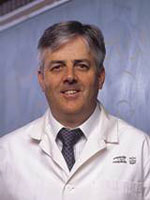Profile of Gary Lopaschuk, PhD

423 Heritage Medical Research Centre
University of Alberta
Edmonton AB T6G 2S2
Tel: 780.492.2170
Fax: 780.492.9753
Email: gary.lopaschuk@ualberta.ca
Positions
Scientific Director, Mazankowski Alberta Heart Institute
Professor, Department of Pediatrics
Adjunct Professor, Department of Pharmacology
President and CEO of Metabolic Modulators Research Ltd. (MMRL)
Research Area
Dr. Gary Lopaschuk (Departments of Pediatrics and Pharmacology) focuses on the regulatory pathways involved in energy metabolism in the heart, particularly the integrated regulation of fatty acid oxidation and carbohydrate metabolism in both the normal heart, the heart of a diabetic, and the reperfused ischemic heart.
Keywords
metabolism, diabetes, insulin, cardiology, physiology, pathology, pharmacology, pediatrics
Research
The heart needs a constant and plentiful source of fuel to maintain normal pump function. The main source of fuel for the heart is normally a combination of carbohydrates and fatty acids. However, in many forms of heart disease, fatty acids dominate as a source of fuel. For example, in uncontrolled diabetes or following a heart attack, almost all the energy needed by the heart is obtained from fatty acids. This is detrimental to the heart and can compromise heart function. However, pharmacological agents which either inhibit fatty acid use by the heart, or increase carbohydrate use, are beneficial to the heart following a heart attack.
This pharmacological approach can also be beneficial in many other forms of heart disease. To maximally exploit this new approach to treating heart disease, it is important to have a better understanding of how fatty acid used by the heart is regulated. Our studies have clarified how fatty acid use is normally controlled at the molecular level in the heart and why control of fatty acid use changes following a heart attack. Researchers also used this new knowledge to develop new pharmacological strategies for treating heart disease. Overall, Dr. Lopaschuk believes that optimizing fuel use by the heart has tremendous potential for treating heart disease. His ongoing research studies could help realize this potential.
In fetal life, the heart obtains most of its energy requirements from the metabolism of carbohydrates. However, within days of birth, fatty acid oxidation increases dramatically (over 10 fold) and becomes the major fuel of the heart. Dr. Lopaschuk's team has defined what molecular changes occur in the heart that are responsible for this switch in energy preference.
Determining the cellular mechanisms responsible for the maturation of fatty acid oxidation following birth not only increases the understanding of the profound physiological changes that occur at birth, but also has direct clinical relevance in the protection of the newborn heart during cardiac surgery. A better understanding of the regulation of energy metabolism in the newborn heart could lead to the development of improved therapeutic approaches for protecting the newborn heart during cardiac surgery.
Heart disease is a major problem in the diabetic. In diabetics almost all of the energy required for heart function is obtained through the metabolism of fatty acids. Dr. Lopaschuk's laboratory and others have shown that decreasing fatty acid use by the heart will increase the use of sugars as a source of energy, which then decreases the likelihood of the diabetic developing heart problems. His team has obtained a better understanding of how fatty acid use by the heart is regulated in the diabetic. His lab has shown that activity of some key enzymes involved in the regulation of fatty acid metabolism is altered. He is presently determining if returning the activity of these enzymes to normal improves heart function in the diabetic. These studies should identify new approaches to decreasing heart problems in the diabetic.



